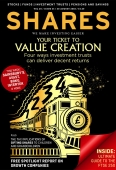Archived article
Please note that tax, investment, pension and ISA rules can change and the information and any views contained in this article may now be inaccurate.
How much cash have you got to buy on a market dip?

Wall Street last week broke the record for the longest bull run in history with the S&P 500’s current rally now beating the previous bull run in the 1990s.
While this is exciting, it also acts as a reminder that the current vibrant stock market conditions globally could be well overdue a correction. If that correction happened, would you have enough cash at hand to go bargain hunting?
Increasingly I’m hearing about fund and portfolio managers positioning themselves for a prolonged period of uncertainty by retaining higher than normal cash levels. And this is also clear in Bank of America Merrill Lynch’s closely-followed global fund manager survey which found cash levels among money managers rose to 5% in August versus 4.7% in the previous month. The 10-year average is 4.5%.
Among the group of financial experts boosting their cash position is Mike Coop, head of multi asset portfolio management (EMEA) at Morningstar. ‘We get excited when prices plummet,’ he says. You may think that sounds odd when the end-game is to make money, but what Coop really means is that a stock market sell-off provides the opportunity to pick up good businesses on cheaper ratings.
CONTRARIAN APPROACH
His investment style is one of a contrarian nature and Coop insists the rewards can be very good if you are patient and the investment ideas were correct.
For example, he prospered after buying Japanese equities in the aftermath of 2011’s fierce earthquake which hurt the local stock market; and a decision to buy European oil stocks when commodity prices slumped has also delivered strong returns.
Having a strong nerve to buy at the height of any crisis is the ticket to success and is one trait that many fund managers lack, according to Coop. ‘Uncertainty in the timing of any payoff is the key factor – the potential time period is too long for many fund managers,’ he says.
Essentially many investment industry decision makers are often incentivised on a short-term basis so they don’t want to take a bet which may not play out for a long time.
Retail investors – i.e. the general public – may have more flexibility to take long-term decisions, assuming they don’t need to access the money for a specific purpose in the short-term.
Therefore it might be prudent to review your portfolio now and check your available cash should an opportunity arise to buy low.
Coop says it is presently ‘tough to find any market offering normal returns for the risk on offer’, however he says the UK market does look more attractive on a relative basis. He is convinced the degree of profit growth is underestimated by the market.
Perhaps now is a perfect time to start drawing up a list of good companies that you would want to own should their valuation become more attractive. We’ve got one example in this week’s Under The Bonnet section, being Intertek (ITRK).
The flipside of having a higher cash weighting in your portfolio is that you’d have less exposure to any further gains if the market kept rising.
As ever you need to determine the correct course of action depending on your risk appetite and own financial goals as everyone’s circumstances are different. (DC)
Important information:
These articles are provided by Shares magazine which is published by AJ Bell Media, a part of AJ Bell. Shares is not written by AJ Bell.
Shares is provided for your general information and use and is not a personal recommendation to invest. It is not intended to be relied upon by you in making or not making any investment decisions. The investments referred to in these articles will not be suitable for all investors. If in doubt please seek appropriate independent financial advice.
Investors acting on the information in these articles do so at their own risk and AJ Bell Media and its staff do not accept liability for losses suffered by investors as a result of their investment decisions.
Issue contents
Big News
- Solid reasons why Headlam still looks attractive despite recent profit warning
- Is a ‘no deal’ risk rising for Sainsbury’s?
- What do Wonga’s woes mean for UK listed subprime lenders?
- Electra takes down ‘for sale’ sign
- FTSE 250 promotion could be the catalyst Avast needs
- Clarkson directors sell shares worth £3.6m
 magazine
magazine








